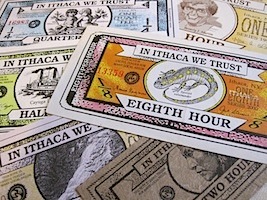Economic Development
- jobs with liveable wages
- jobs with good working conditions
- jobs that allow families time together
- jobs that are creative and interesting
- varied job base, with many smaller shops
- diverse hiring, with wide skill needs
- average person valued for unique talents
- increased access via bus, rail, bicycle, foot
- stable taxes via efficient infrastructure
- money recycles locally via small business
- increased local control via maximum local
production of food, fuel and household goods
(import replacement)
- social safety net for people in transition
- foster social pride and fair distribution of
wealth via progressive taxation
- leadership by community
- many natural areas protected for public
enjoyment
and health
- replenishment of natural resources
|
Economic Decay
- jobs with pay so low as to require subsidy
- jobs with hazardous/oppressive conditions
- jobs that keep families too busy to be together
- jobs that are dull and repetitive
- major employers in few big boxes
- whites only, high tech emphasis
- average person disposable
- increased automobile dependence
- increased taxes for auto/truck infrastructure
- money leaves rapidly via chain stores
- decreased local control via import of
necessities, with associated expanded dependence
on transport fuels & pollution
- welfare for the rich, blame the poor
- foster social alienation and forced
redistribution of wealth via crime &
revolution
- leadership by elites
- natural areas paved; soil, plants and animals
destroyed for personal gain
- consumption of natural resources
|
How Communities Do
It:
- Community development credit unions
- Microloan Funds for creative projects
- Local money (HOURS) & zero-interest
loans
- Adaptive Re-use for industrial expansion
- Local business incubators
- Socially-responsible investing
- Import replacement programs
- Buy-Local campaigns
- Farmer's Markets, food and fuel co-ops
- Superinsulation of housing/business spaces
- Worker Ownership Networks
- Military-to-Domestic conversions
- Local pension funds w/local investment
- Local health funds & nonprofit clinics
- Local tax credits for small farms, solar
&
wind
- Materials Re-use Centers
|
How Elites Do It:
- Regional/national/global banks
- Large loans for conventional purposes
- Dollar dependency, maximum return loans
- Industrial expansion on new land
- Industrial parks w/few jobs per acre
- Investing w/out concern for society/ecology
- Dependence on import of necessities
- Mail Order campaigns, catalog shopping
- Supermarkets and investor-driven utilities
- Waste of fossil fuels enriches utility investors
- Major Employer's Group
- Seeking military contracts
- National pension funds for globalization
- "Health Maintenance" Organizations
- Tax Breaks for insiders
- Landfills
|
Who Wins:
- everybody benefits, including future
generations,
who receive our legacy of beauty and abundance.
|
Who Wins:
- developers, contractors, bureaucrats,
speculators
get rich quick while future generations face
shortages of fuel and food.
|
|









